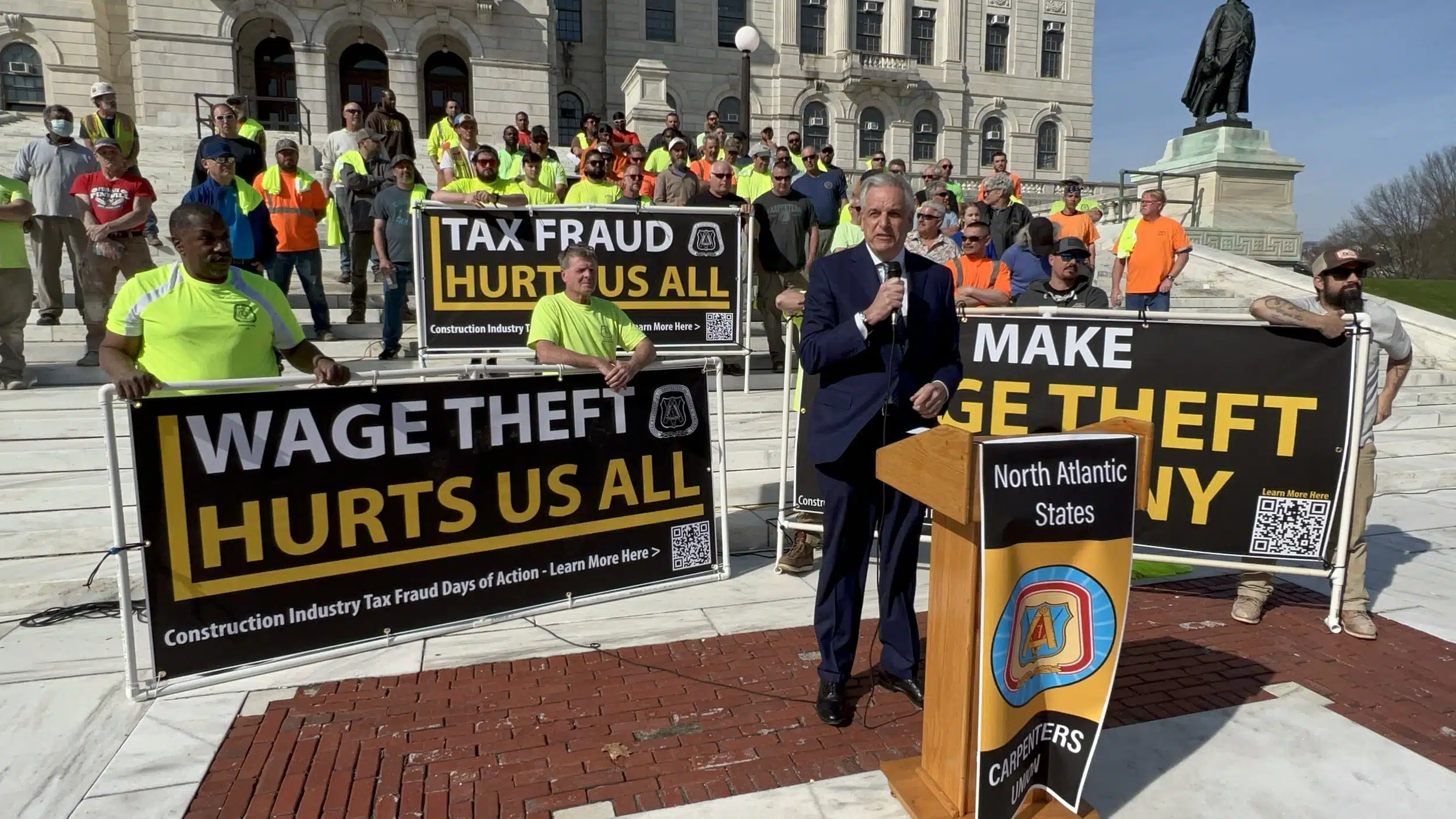When your boss steals your wages, that's a crime - it should be a serious one
By Steve Ahlquist in UpRiseRI
The North Atlantic States Carpenters, Local 330, held their third, almost-annual Tax Day of Action on the south side of the Rhode Island State House on Thursday afternoon to highlight two pieces of legislation being considered in the General Assembly.
H7677/S2775 will
make wage theft a felony.
“To me, it is a matter of fundamental fairness,” said Attorney
General Peter Neronha, testifying in support of the bill before the House
Judiciary Committee hearing the night before the tax day rally. “If you get
beyond all of the legalese and statutory language in this bill, what it comes
down to is this: If someone steals your pet or your appliance, and the value is
over $1,500, that’s a felony, but if they steal your hard earned wages, no
matter how much it is, it’s always a misdemeanor. I don’t know how we got to
this place in the law, but it seems to me that it is now time to fix it.”
The other bill, if passed, will hold contractors responsible for
unresolved wage theft committed by their subcontractors. Right now, contractors
employ subcontractors who oftentimes don’t properly pay their workers. This law
would allow officials to move “up the chain” and hold the general contractor
responsible if the subcontractor fails to pay workers what they are legally
entitled to.
Wage theft in the United States far outstrips all over forms of
theft, combined. In 2017 it was
estimated to have cost workers around $8 billion dollars.
Raising wage theft to the level of a felony will help the Rhode
Island Attorney General to prosecute thieving bosses.
“It is very difficult if not impossible to use the grand jury in these cases because they’re misdemeanors, the grand jury being an arm of the superior court,” said Attorney General Neronha. “The other practical issue, is that extradition on misdemeanors is very, very difficult. We had a case where there were two individuals who were ripping off their employees, stealing their wages, not paying their last pay checks, who left the state. [They were] last seen in Texas, and we can’t extradite them to bring them back.”
The Greater
Providence Chamber of Commerce and the Northern Rhode Island Chamber of Commerce sent
their paid lobbyists to the House hearing to oppose the bill.
Robert Goldberg
is paid $55k a year by the Greater Providence Chamber to
advocate against bills like these. Goldberg tried to portray the bill as
felonizing innocent behavior, such as when a mistake is made in paying wages.
“The tremendous pressure of a felony looming over an honest
businessman, unless you’ve represented or dealt with these people, you will not
understand,” said Goldberg. “It keeps ’em awake at night. It detracts their
concentration, everything. Oh, did I misclassify this guy wrong? There’s enough
worries with running a business, without a felony looming in the background for
honest businesses…
“You’d be amazed at how many of the larger employers in busy
seasons or other circumstances have to hire quick help to solve a problem. Are
they gonna be charged with a felony? You take a heavily regulated financial
institution or banking institution or something like that. And it’s the
employer that bears the charge here. Just being charged with that felony is way
beyond the scope.”
Lobbyist Terrance
Martiesian is paid $36k a year by the Northern Rhode Island
Chamber to advocate against the rights of working people. Martiesian’s tactic
was to exploit the current “labor shortage” situation where more and more
people are working from home.
“Many people are refusing to go back to work in the traditional
model, as they have become accustomed to working from home or are enjoying a
more flexible work schedule,” said Martiesian. “It is easy to envision a labor
market with more individuals choosing to operate as independent contractors and
businesses forced to embrace the new dynamic, to fulfill needed tasks within
the company…
“This couldn’t be a worse time to pass this bill. Every day you
read the paper, employers cannot get employees to work,” said Martiesian, who
urged the legislature to wait to see how the labor market evolves before
acting.
Why would the Chambers of Commerce be opposed to wage theft if
the Chambers represent honest businesses?
“Frankly, I’m quite surprised that the Chambers of Commerce would not support this legislation because the people who are harmed when wages are stolen fall into two categories,” said Jennifer Wood, speaking as the Director of the Rhode Island Center for Justice.
“In the first instance,
it’s the worker whose labor has been stolen and wages have been stolen by their
employer refusing to pay consistent with the law. And secondly, it’s honest
business people who run their businesses in compliance with the wage and hour
laws and are placed at a significant economic disadvantage when their
competitors are able to offer the public a lower price for goods and services,
because they’re not paying their workers. That is a really unfair business
practice. And how can honest business people be expected to compete in the
marketplace if other business owners are simply intentionally refusing to pay
the workforce?”
Both the Attorney General and the Center for justice agree that
businesses that are making honest efforts to properly pay their employees would
not be unfairly victimized by this bill.
